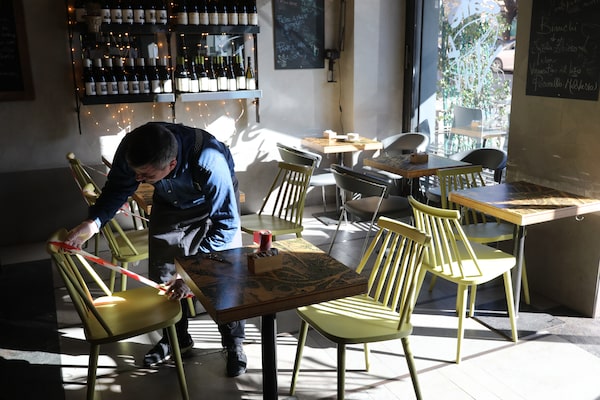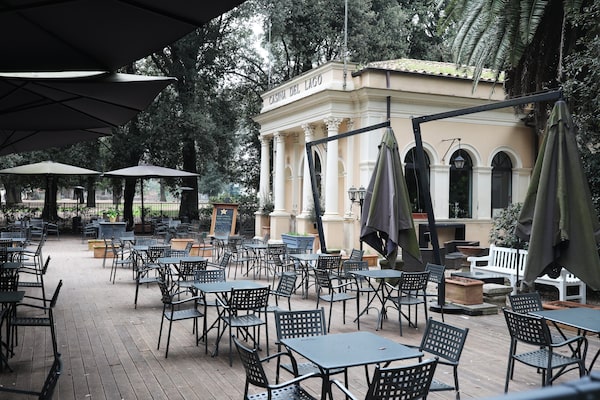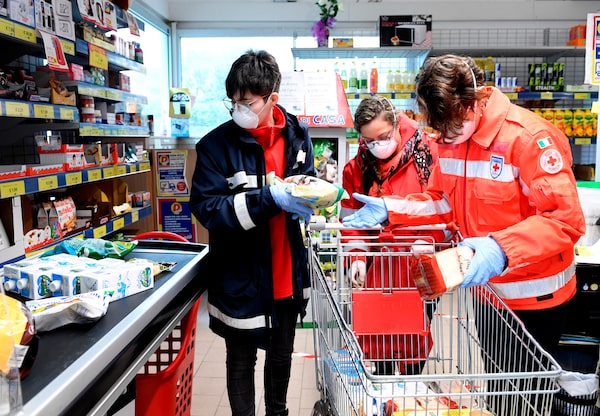
On March 11, Daniele, a waiter for Caffe Vert in Piazza Pilo, attaches tape to a chair so that the customers sit one metre apart from each other in compliance with the anti-coronavirus protocols in place nationwide. The Italian government later shut all restaurants and all stores except for groceries and pharmacies.Marco Di Lauro/Getty Images/Getty Images
In Italy, it’s all about the caffè. By that, Italians mean the place where you drink the coffee as well as the coffee itself – “caffè” refers to both.
It was on Thursday morning, two days after the burgeoning COVID-19 infections and deaths forced the government to slap 60 million Italians into quarantine, when the lives of Italians really changed.
Prime Minister Giuseppe Conte’s second decree, announced the night before, closed all retail outlets, save for supermarkets and pharmacies, and Italians had a collective anxiety attack. Their caffès were closed.
Michelle Russo, a freelance graphic artist who lives in Rome, and mother of two teenagers, wasn’t happy. Like millions of Italians, going to the caffè every morning was a cherished routine: a friendly buon giorno from the barista, a quick chat with the locals or work colleagues, the pleasant clinking of the china cups. All for one euro.
By the second day of the caffè bar shutdown, Ms. Russo was agitated. Being tech savvy, she found a solution – caffè by Zoom, the video conferencing service.
She and her friends now make a caffè at home – a rare occurrence among Italians – and chat on Zoom. “It’s been so nice to see someone,” she said. “I was feeling so claustrophobic. Going out for coffee was just a normal part of our lives and it’s suddenly missing. When we’re in lockdown, we need new routines and we came up with virtual coffee.”
For all Italians, the quarantine and shutdown decrees mark the most radical changes to everyday life since the Second World War. Even during the war, where almost every square metre of Italian soil was a battleground at times, the shops that could open stayed open. The churches were always open. Even during the bubonic plague – the Black Death – in the 14th century, the churches remained open.
You can emerge from your domestic prison only for essential missions – buying food and pharmaceuticals, visiting an elderly relative in distress, taking out the garbage, accepting a home delivery, travelling to an office or factory when it’s impossible to work from home.
To go anywhere, you need to carry a signed government declaration, stating the purpose of your trip. “Visiting a friend” or “getting the car washed” doesn’t cut it. Hundreds of Italians have been arrested or fined for bogus journeys.
Many Italians did not take the national lockdown that came into effect Tuesday morning (the one that left the caffès and other shops open) seriously at first. Now they are taking the quarantine and the physical distancing rules – one metre apart – very seriously.

A caffè at Villa Borghese, one of the biggest parks of Rome city centre and one of the most important landmarks, lies empty on March 13.Marco Di Lauro/Getty Images/Getty Images

Red Cross volunteers in Castiglione della Pescaia on March 13 buy goods to be delivered door-to-door to elderly people who cannot leave their homes.Jennifer Lorenzini/LaPresse via AP/The Associated Press
On Vittorio Emanuele II bridge in Turin, on March 13, a sign reads 'doctors and nurses are our heroes.'Massimo Pinca/Reuters/Reuters
Italy has been hit harder by the novel coronavirus than any country except China. As of Friday evening, the caseload had surpassed 17,660, with 1,266 fatalities, up 250 in 24 hours. Hospitals in northern Italy, the epicentre of the European outbreak, are tragically overloaded. The goal of the quarantine in good part is aimed at smoothing out the emergency hospital stays so the entire system doesn’t break down, forcing thousands to die at home without medical care.
Adapting virtually overnight to life in lockdown has been difficult for most Italians, for they are a social people who don’t shy away from crowds – the opposite, really – live in densely packed cities and don’t have a North American or northern European sense of personal space. Italians are exceedingly tactile and greet friends – even strangers – with hugs and cheek kisses, and love to hit the streets and the piazzas in the evening, since most live in small apartments.
In Italy, an encounter without a coffee, a meal or an aperitivo is called an e-mail.
Italians are also a freedom-loving people who are generally undisciplined, as anyone who has driven in Italy or seen its garbage-strewn streets can attest.
Sonia Vagnarelli, 53, the owner of a small printer-ink shop in Testaccio, a normally buzzy market neighbourhood on the edge of Rome’s historic centre, was astonished how fast most – but not all – retreated to their homes. “Italians don’t like restrictions,” she said. “They don’t like living outside their social comfort zone, which includes bars and restaurants.” But she noticed that old Italians, especially, were having trouble adapting to life indoors, either because they are unaware of the risks they were taking by venturing outdoors – the virus is deadliest to the elderly – or because they couldn’t bear forgoing simple social pleasures. “If they want to take a walk, they should go out at dawn, when no one is around,” she said.
Ms. Vagnarelli was glad when, on Thursday, the government closed almost all shops. She had kept hers open earlier in the week mostly because of the rush of printer-ink orders from doctors and health clinics.
Some teenagers at first did not take isolation orders seriously, finding it hard not to hang out with their friends. Jeannie Marshall, a Canadian freelance writer and long-time resident of Rome, wrote in Quillette that she saw “a group of teenagers mocking the rules by hugging, shaking hands and kissing each other while a middle-aged woman screamed at them from the window of an apartment above.”
By Friday, as the infection tally soared, almost all Italians were respecting the extreme quarantine rules. Rome and other cities were ghost towns. Still, being housebound was excruciating. Carol King, a British writer and editor who traded England a few years ago for the baroque city of Modica, in southeast Sicily, said she feels a gaping social hole in her life.
“What I love here is the daily social encounters,” she said. “You know the butcher, the baker. When you’ve been away, they all give you hugs when you come back. It’s the charm of living in Italy. Now we’re just waving at each other from a distance. It’s like waving someone off at the Titanic.”
Watch: How can you stop the spread of coronavirus in your community? The Globe offers pointers on hygiene and social distancing.
The Globe and Mail
 Eric Reguly
Eric Reguly